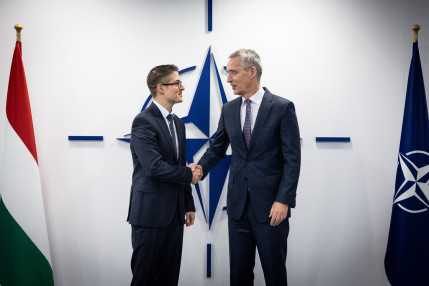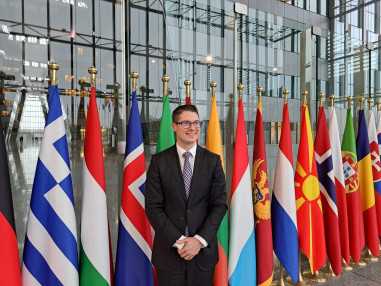Firmness and Empathy – Characteristics of a NATO Ambassador
Text: Eszter Bányász | Photo: NATO, Permanent Representation of Hungary to NATO | 10:08 December 7, 2023Besides his work in the world of security policy, Dr. István Balogh, Hungary’s Permanent Representative and Ambassador to NATO gave an insight into his extensive tasks. In his interview given to defence.hu, he also mentions how the experiences gained as Deputy State Secretary for Security Policy help his everyday work.

What exactly are the tasks of a NATO ambassador?
My first and most important task is to represent the national interests of Hungary in the North Atlantic Council (NAC). This body has convened more regularly since the beginning of the Russo-Ukrainian War, four times a week on average. Besides, I represent Hungary at numerous formal and informal events, and of course, I also have administrative tasks, like every ambassador.
What capabilities and skills do you consider indispensable for this position?
It is especially important for those working in this field to be committed to the consistent representation of the national interests of their countries, as well as to be passionately interested in security and defence policy – in my case, those are true. Proper personal appearance is also very significant, as it provides an advantage mainly during informal networking. In fact, I am talking about the appropriate mixture of firmness and empathy, which is an important basis for diplomacy. As for the allies, colleagues well-prepared in every respect are sitting at the negotiating table, therefore, the perspective of Hungary must be conveyed and represented not only firmly but also with a certain elegance. For this, the more real-life situation experience one has, the better.

What kind of experiences can you use from the period between 2018 and 2022 when you were Deputy State Secretary for Security Policy at the Ministry of Foreign Affairs and Trade?
Back then, we had regular meetings on our own informal platforms with the Political Directors of the European Union, where we had the opportunity to express ourselves more provocatively and openly – as no decisions were made. I regularly made use of this opportunity, because the formulation of Hungarian national interests in foreign affairs required this attitude, but it is not necessarily against my character either. This was a good lesson; one could learn how important it was how one expressed oneself when even a wrong intonation could be significant. During that period of four years, the top directors of foreign affairs had to handle some severe situations: besides the extensive consequences of the war in Ukraine, the evacuation in Afghanistan for instance, which required exceptional coordination.
To mention the basis for this topic, why is it important to deal with security policy?
In an ideal world, security policy might not have to be dealt with, but we do not live in such an ideal world. It is enough to take a look at what is going on in our neighboring country and its consequences for the Hungarians living in Kárpátalja (Zakarpattia) and our national policy, and it immediately becomes clear why security policy is important. If we look at it from a wider perspective, it is clearly visible that there are numerous crisis regions – such as the Middle East – which have a direct effect on European security.

What makes a good security policy expert?
The most important is to be well-read – especially about history-related content – and well-informed. By now, security and defence policy has become an independent discipline among the numerous scientific fields, with extensive literature, therefore, it is also highly important to know about that. A knowledge of cultural principles is also necessary, as it can be an advantage during personal discussions and meetings.
You have published on several topics, including Hungary’s strategic documents, primarily the comparison of National Military Strategies. Do you think that the ever faster change of the world and the security situation make it necessary to revise them more quickly?
Strategic documents are normally for a long term, which means approximately ten years. A great example of this is the Strategic Concept of NATO as the 2022 concept approved in Madrid replaced the 2010 Lisbon one. Strategic documents are also political declarations, in which the given country can define how it interprets and where it places itself in the complicated international system of security policy. In this regard, the faster change of the world would make it justifiable to publish such documents more frequently but it is always the discretional right of the top political leadership how it reacts to the surrounding events. I think that the Hungarian practice is considerate and cautious enough, which can be to our advantage.

This year, you participated in the Ludovika Festival organized by the University of Public Service. Can we say that the knowledge conveyed at similar events contributes to the growth of social resiliency, which today is definitely considered as a priority?
Absolutely, this is among the most important themes, not only in NATO but in the European Union as well. Although social resilience is not a revolutionary new term, the field received new emphasis due to the security policy developments of the past ten years. In my opinion, it is not only an opportunity that those dealing with security policy can deliver lectures to share how Hungary thinks about certain issues, but also a kind of responsibility for the sake of social awareness, which can provide guidance in our world strongly defined by media.